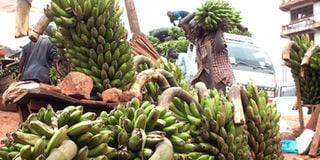Prime
Matooke prices to soar

A man offloads matooke from a truck. A slight delay in its transportation puts the traders at a risk of making huge losses.
Matooke is a dish for most Ugandans and according to Mr Denis Boowe, a trader at Owino Market, this increases competition for it since only a few districts supply it. These districts are Mbarara, Fort Portal, Kiboga and Masaka.
“We practically fight for the food when buying it from farmers. They are few and yet we have to supply many traders,” he says. Mr Boowe says the season for matooke is often from January to March and June to August. Now that the season for matooke is almost ending, Mr Boowe thinks there will be more tension among traders as they have to fight to get enough food to sell.
“In two weeks time, there is a possibility that a sack of matooke that now costs Shs70,000 will cost Shs100,000. Then a bunch of matooke may go for Shs40,000 up from Shs25,000. In that period, I won’t be able to stock as much as I usually do because the buyers will still be many and yet the matooke will be little,” explains Mr Boowe.
Mr Farouk Kibirango, a trader at Kalerwe Market, agrees with Mr Boowe. He says as the season ends, they are being supplied with matooke that is not mature and has been highly affected by the sun. “It becomes hard to convince a person to buy it because when one comes to buy food, they want the best. They won’t understand what is going on.”
Both traders say matooke trade is a risky venture because a slight problem causes losses. Mr Boowe says if the car transporting the food gets a mechanical problem (slight or severe), by the time it gets to Kampala, the food may be spoiled (ripe) and can’t be sold. Mr Boowe says this makes business hard because they have to sell it at a much cheaper price to avoid huge losses. “Sometimes you buy matooke at Shs1m and get a profit of only Shs100,000,” Mr Boowe says.
The unpredictable weather has also affected the supply of the matooke on the market according to the traders. Mr Kibirige says, “There are insects and diseases that affect the banana plants. These may affect the whole plantation leaving almost no matooke worth selling.”




